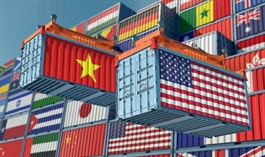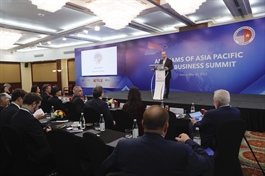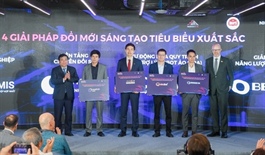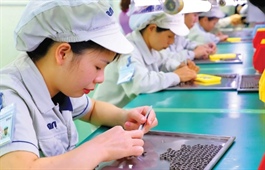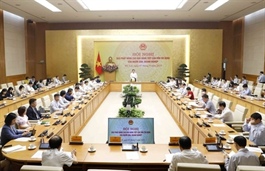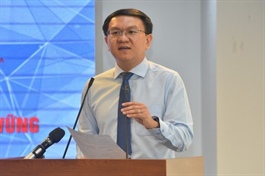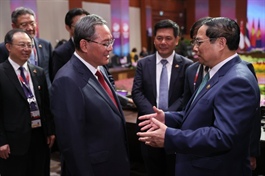Vietnam, US upgrade ties to Comprehensive Strategic Partnership
Vietnam, US upgrade ties to Comprehensive Strategic Partnership
US President Joe Biden underscored the historic significance of his visit, stressing its importance not only for the bilateral relations but also for the broader Indo-Pacific region and the world.
Vietnam welcomes the elevation of bilateral relations between the two nations to a Comprehensive Strategic Partnership to foster peace, cooperation, and sustainable development.
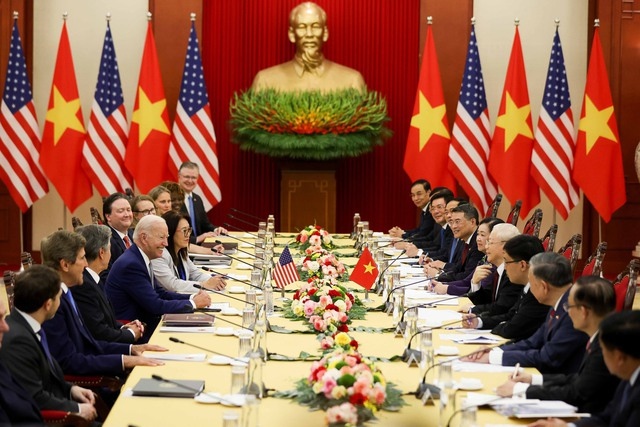
Overview of the meeting. Photos: Nhat Bac |
The upgrade of bilateral ties was announced following the meeting between General Secretary Nguyen Phu Trong and US President Joe Biden today [September 10].
During the meeting, Trong expressed his appreciation for President Joe Biden's visit to Vietnam on the 10th anniversary of establishing their Comprehensive Partnership (2013-2023).
He noted the visit holds special significance as it provides an opportunity for the leaders of both countries to discuss bilateral relations and global issues in the interest of their respective peoples and contribute to regional and world peace, cooperation, and sustainable development.
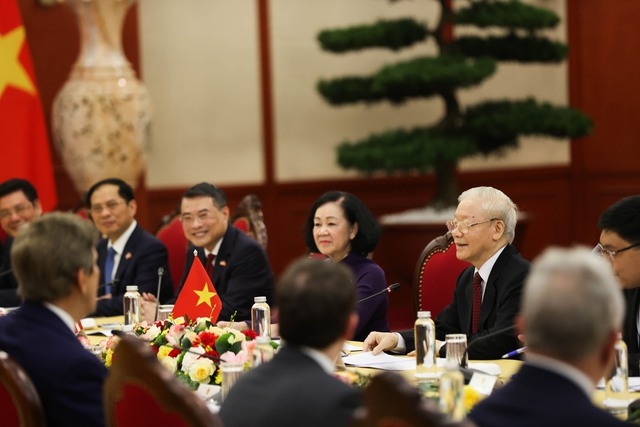
Party chief Nguyen Phu Trong at the meeting. |
The Party chief outlined Vietnam's accomplishments over nearly four decades of comprehensive innovation, focusing on achieving the goals of "prosperous people, strong country, democracy, equality, and civilization". These goals have been pursued through key directions, including economic development, social progress, establishing a socialist state under the rule of law, and active international integration.
He praised the significant economic and social achievements of the US under the leadership of President Joe Biden and recognized the US's contributions to global cooperation in addressing major challenges such as public health, environmental protection, climate change response, and food security.
Trong reaffirmed Vietnam's consistent foreign policy of independence, self-reliance, peace, friendship, cooperation, development, and the diversification and multilateralization of foreign relations.
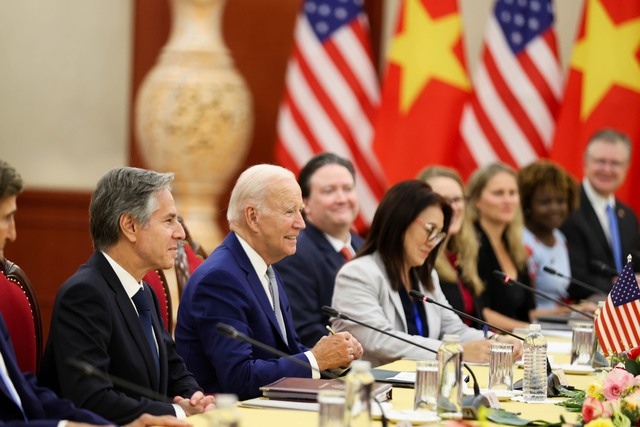
US President Joe Biden. |
Vietnam remains an active and responsible member of the international community and adheres to the "four no's" policy. Regarding complex international situations and conflicts, Vietnam advocates for peaceful dialogue and resolution based on respect for the fundamental principles of international law and the United Nations Charter.
Trong noted that Vietnam highly appreciates US support for its stance, as well as that of ASEAN, on East Sea-related issues, and urged the US to continue supporting and actively contributing to peace, security, cooperation, freedom of navigation and overflight, and the legitimate interests of nations in the East Sea.
Vietnam also urged avoiding the use or threat of force and actions contrary to international law, which could further complicate the situation. Instead, it called for peaceful resolution of disputes, adherence to the Declaration on the Conduct of Parties in the East Sea (DOC), and the acceleration of negotiations and signing on the Code of Conduct (CoC) in the East Sea in line with international law, including the 1982 United Nations Convention on the Law of the Sea (UNCLOS).
Trong reflected on Vietnam's historic cooperation with the US during World War II when the two countries joined forces against fascism. He noted that President Ho Chi Minh even quoted excerpts from the US Declaration of Independence in the opening of Vietnam's Declaration of Independence. President Ho Chi Minh also sent a letter to the US Government requesting full diplomatic relations. Nevertheless, the relationship between the two nations underwent many upheavals, most notably the longest and fiercest war of the 20th century following World War II.
“Vietnam is pleased to note that, since the normalization of relations in 1995, and especially after the establishment of the Comprehensive Partnership in 2013, the bilateral relations have grown significantly and become substantial and effective,” Trong said.
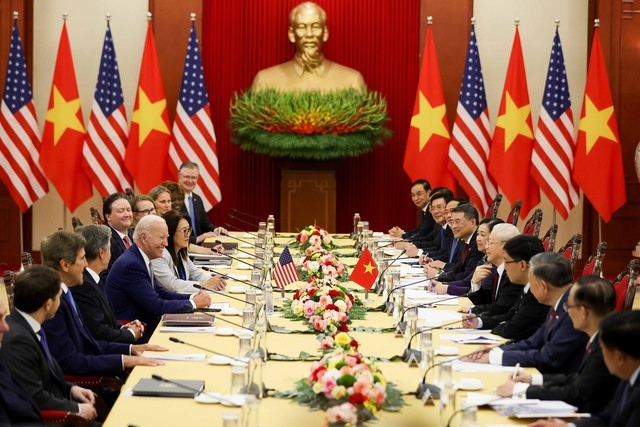
The two leaders during the welcome ceremony at the Presidential Palace. |
Based on these significant premises, in the interest of the peoples of the two countries, with the mutual goal of tightening cooperation for peace, cooperation, and sustainable development in the new context, he said that Vietnam welcomes the elevation of their relationship to a Comprehensive Strategic Partnership.
The two leaders concurred that the key drivers of Vietnam-US relations hinge on adherence to fundamental principles that dictate the course of the bilateral relations, including respect for the United Nations Charter, international law, political ideology, and each other's independence, sovereignty, and territorial integrity.
Trong underscored the importance of mutual understanding, appreciation, recognition, and respect for legitimate interests and non-interference in each other’s internal affairs. The guiding principle for the development of Vietnam-US relations is summed up in the motto "putting aside the past, overcoming differences, promoting similarities, and looking to the future." Vietnam appreciates the US's assertion that it supports the country to be "strong, independent, self-reliant, and prosperous," Trong said.
He also highly appreciated the agreements reached by the leaders of both countries in the Joint Declaration to elevate Vietnam-US relations to a Comprehensive Strategic Partnership for peace, cooperation, and sustainable development.
Nguyen Phu Trong highlighted several key directions to boost Vietnam-US relations. These encompass enhancing mutual understanding, adhering to guiding principles, fostering long-term stability, facilitating high-level engagements and sectoral cooperation, and promoting people-to-people exchanges.
The General Secretary welcomed the robust promotion of economic, trade, and investment cooperation and inclusive economic growth with a focus on innovation, which continues to serve as the foundation and driving force of the relationship and cooperation between the two nations. Both sides also agreed on the need to create a significant breakthrough in scientific and technological cooperation.
President Joe Biden expressed his delight as he visited Vietnam and thanked the Party Chief for the warm welcome accorded to him and his delegation.
Biden underscored the historical significance of his visit, emphasizing that it holds importance not only for the bilateral relationship between the two countries but also for the broader Indo-Pacific region and the world. He reiterated the US’s commitment to supporting an open, stable, secure, interconnected, and prosperous region.
Biden expressed his appreciation for Vietnam's pivotal role and position in the region and praised Vietnam's active role in solving numerous regional and global issues, including its efforts in addressing climate change.
The President reaffirmed his support for ASEAN's central role and his eagerness to collaborate with Vietnam to bolster ASEAN's unity and prosperity.
He emphasized the strategic importance of the East Sea to international prosperity and stability and reaffirmed the US’s commitment to the goals of the Indo-Pacific Economic Cooperation Framework.
The President conveyed his deep respect for Vietnam as a nation and praised its development accomplishments and contributions to international initiatives.
The President expressed his support for Vietnam's development endeavors, including economic cooperation and scientific and technological collaboration in areas such as electronics industry development and climate change mitigation, and the promotion of clean energy.
Biden highly valued the elevation of the bilateral relationship between the two countries to a Comprehensive Strategic Partnership, recognizing the mutual benefits it brings to both nations and international interests.
Both leaders expected the results of their talks and President Joe Biden's visit would make a valuable contribution to advancing bilateral relations in the new era, serving the interests of the two peoples and promoting peace, stability, and sustainable development.



